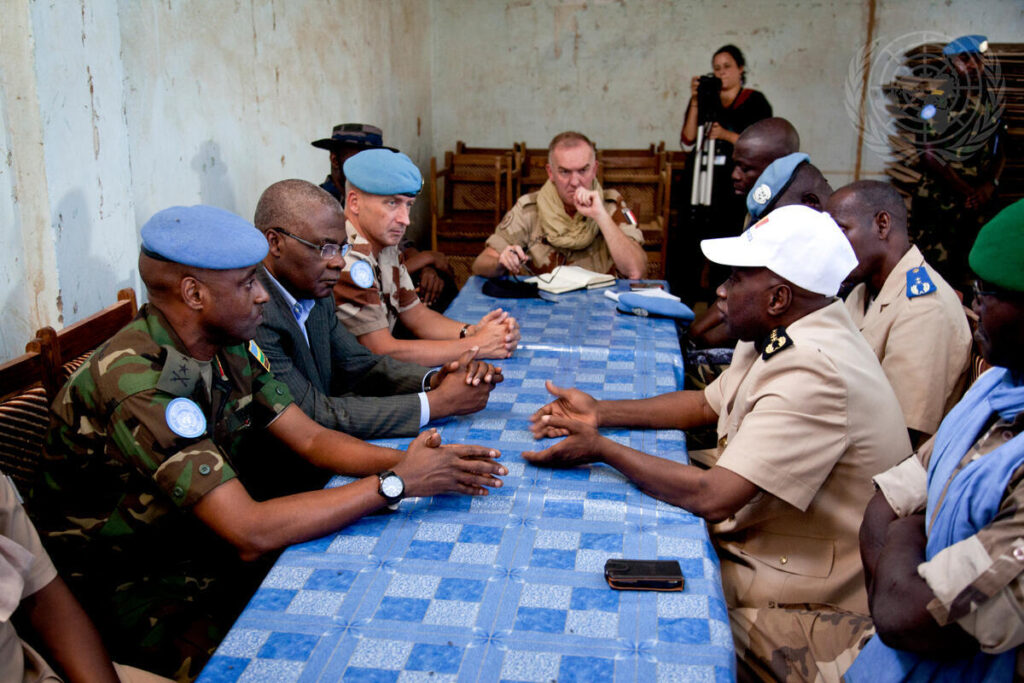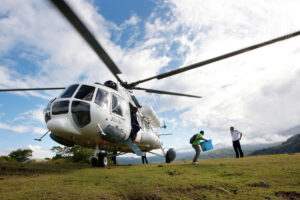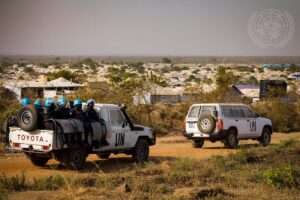Peacekeeping is one of the most visible mechanisms within the UN’s toolbox for protecting civilians and supporting countries in the transition from conflict to sustainable peace. However, peacekeeping missions can face substantial difficulties in implementing their mandates when cooperation from host-country1The term ‘host-country’ is inclusive of UN-recognized host-states, other host-authorities, non-state armed groups, and civilian communities. interlocutors is limited or conditional. Low cooperation, or in some cases direct obstruction and targeting, threatens the safety and security of peacekeepers, undermines the performance of the mission, and prevents material progress towards peace across the life span of a mission. Such actions can raise genuine questions about how to maintain host-country consent, a foundational aspect of cooperation.
In response to these challenges and in support of the United Nations’ Action for Peacekeeping Plus (A4P+) initiative, the Stimson Center, in partnership with the Permanent Missions of Australia, Ghana, Indonesia and the United Kingdom to the United Nations, organized an in-person expert roundtable on May 18, 2022 to discuss host-country consent in UN peacekeeping. As part of the event, UN member states and Secretariat colleagues exchanged views on how consent should be interpreted in practice, and shared ideas for enhancing cooperation between peacekeeping missions and host-countries. The workshop included a presentation on the preliminary findings of research conducted by the Stimson Center’s Protecting Civilians in Conflict Program on this issue area. This meeting note integrates the main points raised in the workshop under the Chatham House rule of non-attribution, though does not necessarily reflect the views of all participants.
Nature of Consent
The element of consent importantly distinguishes peacekeeping from other international interventions. First codified in the 2000 Report of the Panel on UN Peace Operations (known as the Brahimi Report), consent of the main conflict parties is recognized as a key principle of UN peacekeeping, alongside “impartiality, and non-use of force except in self-defence and defence of the mandate.”2United Nations, Department of Peacekeeping Operations, “Chapter Three: The Basic Principles of United Nations Peacekeeping” in the United Nations Peacekeeping Operations: Principles and Guidelines, (January 2008) 31. https://peacekeeping.un.org/sites/default/files/capstone_eng_0.pdf. Consent necessitates the trust of the parties, paving the way for productive communication and cooperation with the peacekeeping mission. But while consent is widely seen as essential to the success of a mission, there exists a lack of understanding and agreement among peacekeeping stakeholders about how to uphold it in practice.
Navigating consent is simpler in theory than in practice, proving a genuine challenge for peacekeeping missions in part due to the environments they deploy to. Missions often operate in contested contexts where there is a proliferation of conflict actors, and the jurisdiction of the host-state(s)3The term ‘host-state’ refers to the UN member state(s) that is hosting the peacekeeping mission within their territorial borders. This term applies to those states that have signed either a Status of Forces Agreement (SOFA) or Status of Mission Agreement (SOMA) with the UN. is under question, making it difficult to engage parties from the start. As one participant expressed, “if the state were secure, then peacekeepers wouldn’t be needed”. This is arguably most evident in cases where the peacekeeping mission is mandated to help restore state authority.
Consent becomes a greater focus on the ground when it is lacking – particularly when cooperation or communication with the mission is hindered by host-country counterparts. This can be profoundly felt by the mission on the ground, including through restrictions of movement; communication fall outs; delays in visa procurement; delays and/or restrictions on the import and transportation of critical supplies; restrictions on the deployment of peacekeepers of certain nationalities; issues obtaining flight permissions for troop movements; obstruction of human rights investigations; and in the worst of cases, attacks on peacekeepers.
In situations where consent has greatly deteriorated, missions may even be asked to leave by the host-state, as was the case in Eritrea/Ethiopia, Burundi and Chad. Yet the more common reality is the decline of a peacekeeping mission “by a thousand cuts” – or in other words, small obstructions that build over time and ultimately leave the mission unable to implement its mandate. To prevent this, consent on the ground should be considered dynamically rather than as a static given, requiring vigilant management to keep it strong. Consent must also be considered in balance with the Council’s prerogative to apply a mandate as it sees fit for maintaining international peace and security.
As a peacekeeping operation strives to deliver on its mandate, the level of acceptance and support by host-communities can also have a significant impact on its efficacy. Direct engagement with host-populations has been cited as key for fostering mission acceptance, such as through development project or quick impact projects (QIPs) that benefit civilians at the local level. Collaboration and adaptation to the local context were also emphasized as good practices for establishing trust and cooperation with communities. For example, in Abyei, a lack of police presence led to the innovative creation of 34 civilian-led protection stations by UN police, 4United Nations, Security Council, “Situation in Abyei: Report of the Secretary-General,” S/2022/316, (14 April 2022) para. 41. enabling the strengthening of community capacity and relations with the mission.
Determining Consent
Prior to the deployment of a peacekeeping mission, the Security Council consults with the host-state(s) (and where possible, other leading parties to the conflict) to establish consent for the mission. In a few instances, direct requests for international intervention have even been made to the Council. At the offset of a mission, the consent of the host-state(s) is usually at its most clear and robust, allowing for the peacekeeping mission’s installation to be relatively free of challenges to host-state cooperation. And although there is no document that enshrines consent at this stage, the Status of Forces Agreement (SOFA) or Status of Mission Agreement (SOMA) provides evidence of the host-state(s) agreement to an international presence in their sovereign territory.
It is important to note that consent at the beginning of a peacekeeping mission should not be viewed as the apex, but rather the baseline on which to build continued partnership. Establishing open lines of communication, for example, with host-country interlocutors is vital for strengthening consent. Increased attention could also be put into the sharing of effective strategies and lessons learned by peacekeeping personnel across mission settings. Further, regional organizations, like the African Union, could play a greater role in deepening engagement and facilitating cooperation between host-states and UN peacekeeping missions.
There may also exist differences between consent for the physical presence of the mission and support for its mandate and the political process, particularly as the mission’s priorities and tasks change over time in response to developments. Another ongoing challenge is that consent is confirmed by the Security Council at the strategic level with the host-state(s) and, when possible, other leading conflict parties, but may not trickle down as expected throughout the government or to civil society and local communities, leading to obstacles to the work of the mission on the ground. The host-state should thus actively communicate out to local governance and host-populations why the peacekeeping mission is present and what it is mandated to do.
The Dilemma of Mandate Renewals
As circumstances on the ground evolve and mandates approach their expiration date, the Security Council may need to adjust the strategy and directives for a peacekeeping mission. However, this raises a sensitive question: how much influence should a host-state have in the mandating process? In their responses, participants highlighted that there exists a lack of clarity on the opportunities for host-states to engage with the Security Council, and in particular with the penholder, ahead of a mandate renewal.
Some participants shared that the involvement of the host-state is vital for ensuring the mandate is fit for purpose, with a few emphasizing the value of hearing from the host-state in briefings ahead of Council negotiations. Another suggestion was that working groups, such as the Working Group on Peacekeeping Operations, could serve as a forum for more regular exchange between Security Council member states and host-country counterparts. However, while consultation with host-states should be undertaken, participants underscored the fact the Security Council cannot be beholden to the host-state for receiving its approval on all aspects of the mandate. And though a host-state may have the right to make a request of the Council regarding the mission’s mandate, such requests have not historically been part of the culture of peacekeeping.
On a practical level, the capacity of current host-states to deepen their substantive engagement with the Security Council may be lacking. Host-states may not have the appropriate institutional knowledge of Council processes and are usually already stretched thin by domestic challenges. One participant mentioned that the many reporting requirements to the UN can distract from a host-state’s core mission of governance.
Host-states may also have divergent views on what a UN peace operation should and should not do. For instance, prior to the creation of the mandate for the United Nations Integrated Transition Assistance Mission in Sudan (UNITAMS), the Sudanese government was internally divided over whether the special political mission should take up some of the protection activities conducted by the peacekeeping mission then in drawdown (the United Nations – African Union Mission in Darfur (UNAMID)). Some within the host-state felt that the government did not yet have the capacity to take up these protection activities and could use the continued support of the UN. The Security Council thus waited for the host-state to arrive at a united conclusion, leading the Council to include support to the implementation of the National Plan for Civilian Protection in the special political mission’s mandate.
In recent mandate renewals, host-state opposition to specific aspects of the mandate has also exposed disparate views in the Council on whether primacy should be given to meeting a host-state’s request or to the traditional norms of peacekeeping. While host-states are a key stakeholder for a peacekeeping mission, the Security Council must consider the interests of all parties when renewing the mandate. This includes the interests of civilians, other conflict parties, troop- and police-contributing countries, neighboring countries, and regional interlocutors. Additionally, the Council may need to mandate activities or impose actions (e.g., sanctions) that the host-state(s) may not be fully supportive of — to safeguard the safety of UN personnel, protect civilians, address human rights violations, and implement the mission’s mandate.
A Gap in Expectations
As missions age, cooperation from host-country counterparts can decline when expectations for the mission differ from its mandate or capacity. When this occurs, there is a strong risk that conflict parties could begin to question the mission’s utility and presence. Achieving a common understanding among UN and host-country stakeholders of what a peacekeeping operation can and cannot do on the ground is thus essential. Direct and regular communication with the conflict parties on “what we are doing, why we are doing it, and what we see as the impact” was highlighted as paramount. However, this is no small feat. As the nature of conflict rapidly evolves, the increased fragmentation of actors in modern day conflicts is of particular concern. Other conflict trends, such as the rise of mis/disinformation, climate-related insecurity, and the heightened influence of other security personnel on conflict dynamics, were advanced as further complicating missions’ strategic communication efforts to populations and host-authorities alike.
Mis/disinformation can have a corrosive effect on consent due to the speed and depth of transfer, thanks in part to digital technology. It was, for instance, highlighted that in a variety of peacekeeping contexts there is continued misinformation about the SOFA/SOMA serving as the source of consent for a mission. In a few cases, this misconception has even led to requests by host-country actors for the mission to re-negotiate the SOFA/SOMA; should such requests have spread throughout the host-country, it could have dire consequences for the mission.
Cooperation can also decline when the mission holds the host-state to greater accountability, such as on issues of access or human rights monitoring. In a few peacekeeping contexts, the need for host-state accountability has increased as the host-state has welcomed the presence of other security personnel in country who negatively impact human rights and the protection of civilians. And while engaging bilateral actors remains the sovereign right of a state, one participant mentioned that there is a pervasive misconception among host-states that engagement of different foreign actors in country can occur without one affecting the other.
Another potential point of friction is the mission’s engagement with non-state conflict parties, which the host-state may interpret as not being to their advantage. For instance, while the space and time around elections is a particularly sensitive period, the mission’s impartial interaction with all parties is essential for the strengthening of democratic processes and ensuring the safety and security of peacekeepers.
Peacekeeping missions also face a constant battle of perception. For example, when the mission’s actions are perceived as being in favor of one party, missions risk being labeled as biased, potentially harming cooperation with other conflict parties and connected host communities. In the context of Lebanon, it was mentioned that conflict parties see the UN as giving some legitimacy to their cause by mere presence and will befriend it for a while to see what may be gained. Regardless of context, the room for cooperation with conflict parties thus often depends on the conflict parties’ own perceived self-interests.
Ultimately, there are no easy answers for how to maintain consent for a peacekeeping mission across its life span, necessitating continued discussion of the matter. Roundtable participants did, however, re-affirm the link between host-country consent and cooperation, and that action to maintain consent should remain tailored to each unique context. Lastly, it was acknowledged that while the host-state(s) is the primary interlocutor with whom consent should be discussed, the support of host-communities is integral to ensuring the keeping of the peace.
This roundtable summary has been written by Julie Gregory, Research Associate in the Protecting Civilians in Conflict Program at the Stimson Center, with support provided by Faith Goetzke, former Research Intern in the Protecting Civilians in Conflict Program at the Stimson Center.

Notes
- 1The term ‘host-country’ is inclusive of UN-recognized host-states, other host-authorities, non-state armed groups, and civilian communities.
- 2United Nations, Department of Peacekeeping Operations, “Chapter Three: The Basic Principles of United Nations Peacekeeping” in the United Nations Peacekeeping Operations: Principles and Guidelines, (January 2008) 31. https://peacekeeping.un.org/sites/default/files/capstone_eng_0.pdf.
- 3The term ‘host-state’ refers to the UN member state(s) that is hosting the peacekeeping mission within their territorial borders. This term applies to those states that have signed either a Status of Forces Agreement (SOFA) or Status of Mission Agreement (SOMA) with the UN.
- 4United Nations, Security Council, “Situation in Abyei: Report of the Secretary-General,” S/2022/316, (14 April 2022) para. 41.




